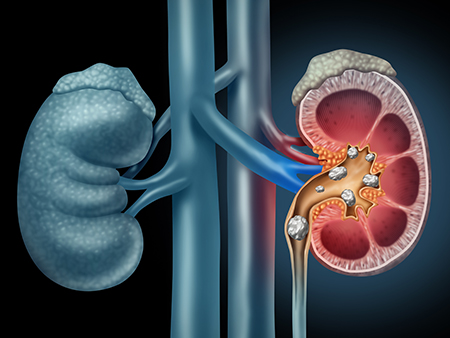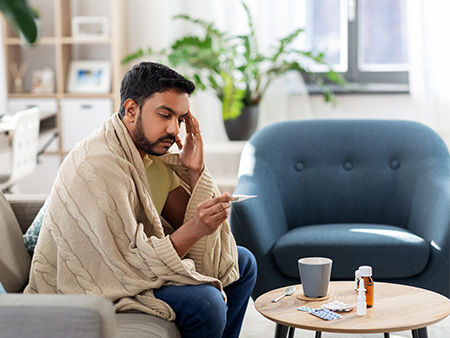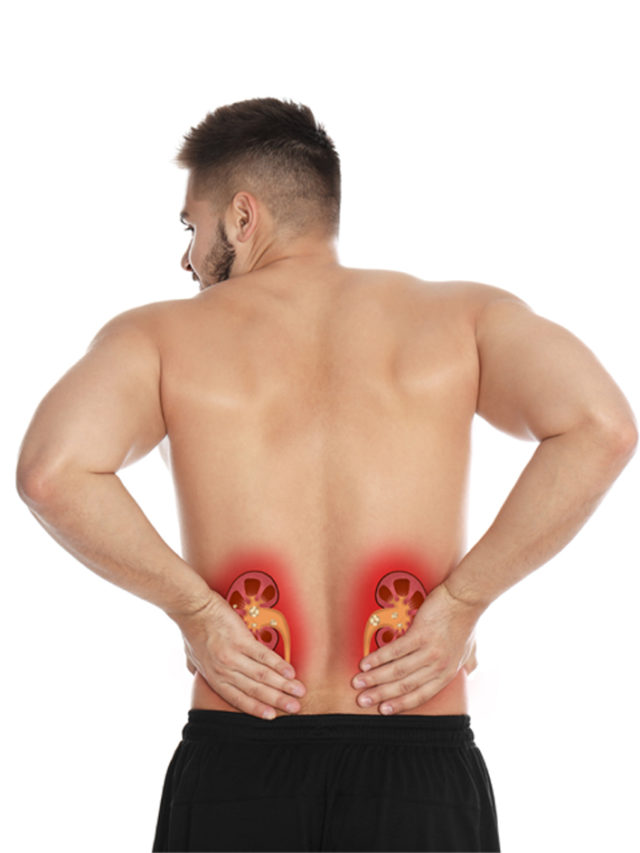Introduction

Kidney stones are clusters of solid minerals and salts that develop inside the kidneys. They are also known as renal calculi and urolithiasis. Kidney stones can be caused by various factors, including diet, excess body weight, medical conditions, specific supplements and drugs.
A kidney stone is a solid item created from urine-based compounds. Shockwave lithotripsy, ureteroscopy, percutaneous nephrolithotomy or nephrolithotripsy are some of the paramount options for treating kidney stones.
Severe lower back pain, blood in the urine, nausea, vomiting, a fever, chills and bad smell are some common symptoms of kidney stone.
Even little stones can be painful as they pass through your urinary tract and leave your body.
Types of kidney stone
Calcium stones
The most prevalent type of kidney stone is calcium stone. In this case, kidney stones develop when there is a lack of fluids and a high concentration of calcium, oxalate, cystine or phosphate.
Uric acid stones
One kind of kidney stone is a uric acid stone. Small stones can develop from an excess of uric acid in the body, which can make urinating painful and result in blood in the urine. In general, Small uric acid stones might dissolve by themselves.
Kidney stones develop in the urinary tract, an area where urine leaves the body. They can also result in pain and blood in the urine.
Cystine stones
A rare condition known as “cystinuria” is the root cause of cysteine stones. This condition occurs when a naturally occurring chemical called “cystine” leaks into your urine.
Kidney stones can develop when the urine contains an excessive amount of cystine. These stones may lodge anywhere throughout the urinary tract, including the bladder, kidneys and urethra.
Struvite stones
A bacterial upper urinary tract infection (UTI) is the root cause of struvite stones. The bacteria‘s waste product ammonia can lessen the acidity of the urine. In most cases, more alkaline urine will produce struvite stones.
A subset of kidney stones known as struvite stones develops due to a UTI. Struvite stones are frequently referred to as infection stones.
Causes of Kidney stones
The following are some of the vital causes of kidney stones.
Drinking too little water
Drinking more water is crucial in lowering the likelihood of developing stones. As a result, the elements in urine that cause stones are diluted. Consuming at least 3 quarts of liquid per day is recommended to avoid stone formation.
Exercise
In reality, removing kidney stones naturally can be achieved through exercising. A light jog or cardiac exercise are good exercises for people diagnosed with kidney stones.
Obesity
Obesity is said to be an elevated risk of kidney stones. People with abnormal BMI have a higher chance of developing diabetes, hypertension and hyperlipidemia than non-obese adults.
Weight loss surgery
Kidney stones are more common in those who have had bariatric surgery. According to research, those who have undergone gastric bypass have altered urine and greater concentrations of oxalates (the particles that cause kidney stones).
Eating food with excess salt or sugar
Fructose consumption has increased recently and is associated with a higher risk of kidney stones. It is typically consumed in the form of sugar.
The calcium in your urine increases if you eat a lot of sodium (a component of salt).
Symptoms of Kidney stones
Blood in the urine
One of the most typical symptoms of kidney stones is blood in the urine. Until a urine sample is viewed under a microscope, the blood may not be apparent as it is due to kidney stones.
Vomiting
Severe pain accompanied by vomiting is one of the warning signs and symptoms of kidney stones.
Nausea
People with kidney stones frequently experience nausea and vomiting. The kidneys and GI tract share neural connections, which results in these symptoms. Kidney stones may set off GI tract nerves, resulting in an unsettled stomach.
Discoloured or foul-smelling urine
Dehydration can cause your urine to become very concentrated and have a strong ammonia odour. Before flushing, if you smell something particularly strong, it could indicate a urinary tract infection (UTI), a bladder infection or metabolic disorders.
Chills
Kidney or other urinary tract infection symptoms include fever and chills. A kidney stone may cause this dangerous consequence. Along with kidney stones, it may potentially indicate additional severe issues.
Fever
Fever, chills, nausea or pain in your lower back, abdomen or pelvic region can all be kidney infection symptoms. This may also be due to bacterial buildup.
A bacterial buildup could result from this. The signs of a kidney infection are similar to those of kidney stones, but they may also include chills and shivering.

Urgency to urinate
Your urge to urinate will increase if your stone descends into your groyne, and you’ll urinate frequently. This may also occur due to a severe burning sensation.
Urinating small amounts of urine
Low urine volume consistently is a crucial risk factor for kidney stones. Dehydration or not drinking adequate water can all contribute to low urine volume.
Kidney stone treatment
The following are some of the treatments to reduce kidney stones.
Pain relievers
Small stones might be uncomfortable to pass. Your doctor might prescribe ibuprofen or naproxen sodium to treat minor pain.
Medical therapy
Your doctor could advise using a phosphate-containing medication or a thiazide diuretic to help prevent calcium stones. Your doctor may also recommend allopurinol to lower the amounts of uric acid in your blood and urine.
Kidney stone removal is made significantly simpler with a new high-powered laser technique known as the “Moses treatment”.
You can use apple cider vinegar to dissolve kidney stones quickly. Apple cider vinegar, made from fermenting apples, contains phosphoric, citric and acetic acids that quickly dissolve most kidney stones.
Diagnosis of kidney stone
Blood test
Blood testing is one of the diagnostic methods that may be used if your doctor thinks you have a kidney stone. Blood tests may suggest that you have an excess of uric acid or calcium. The results of a blood test allow your doctor to look for additional medical issues while also monitoring the condition of your kidneys.
Urine Test
Tests on your urine can reveal whether it has high concentrations of minerals that can cause kidney stones. A health care provider can also identify the sort of kidney stones you have using urine and blood testing. The process medical practitioner tests your urine sample during a urinalysis.
Imaging test
An imaging technique for diagnosing kidney stones is an ultrasound test. This is a rapid and simple noninvasive examination. Lab testing will identify the composition of your kidney stones.
Analysis of passed stones
A kidney stone analysis is a test that determines the components of a kidney stone.
Risk factors of kidney stone
The following conditions are some of the risk factors for kidney stones.
Dehydration
Dehydration can also play a role in developing kidney stones and urinary tract infections. Damage to the kidneys may occur if untreated.
Diet
Try to consume the following if you are diagnosed with kidney stones.
- Take more liquid foods
- Keep consuming meals high in calcium
- Eat less salt and mix water with lemon and lime juice
- Eat nutritious meals
- Limit your meat intake
Family or personal history
The likelihood of developing kidney stones is higher in those with a family history. However, it is unclear whether this higher risk is due to genetic predispositions, environmental exposures or a combination of both.
Obesity
Weight gain and obesity raise the possibility of kidney stone development. Women may be in greater danger than men overall. One of the leading causes of morbidity is kidney stones.
Digestive diseases and surgery
Occasionally, gastrointestinal symptoms, including nausea, vomiting and stomach pain, are brought on by kidney stones. Kidney stones could also cause acute low back pain and abdominal discomfort.
Metabolic disorders
The excessively acidic urine brought on by insulin resistance in metabolic syndrome is connected with an increased risk of uric acid stone formation. These conditions may also be accompanied by calcium oxalate stones since a higher body mass index is connected to a higher urinary oxalate excretion.
Urinary tract infections
If the underlying issue is not resolved and the infection persists, conditions like an enlarged prostate gland or a kidney stone can induce UTIs that can cause kidney damage.
If untreated, UTIs in young children with high fevers can occasionally result in kidney damage.
Preventions for kidney stone
The following are the ways to prevent kidney stones.
Drink water
Making sure you have enough water daily to stay hydrated is the most excellent approach to avoiding kidney stones. It will help if you consume up to 3 litres daily to prevent stone recurrence. You can also drink other liquids like tea and coffee.
Drinking plenty of liquids will aid in flushing out kidney stones from the body. The best liquid to drink while passing a kidney stone is water (or water with citrus fruits).
Add fresh lemon juice to your water
The salt in citric acid called citrate binds to calcium and prevents the production of stones. Studies have demonstrated that consuming two lemons’ worth of juice or a half-cup of concentrated lemon juice daily will raise urine citrate levels and perhaps lower the incidence of kidney stones.
Avoid fizzy drinks
Consuming carbonated beverages has been associated with kidney stones, diabetes and hypertension, all of which are risk factors for chronic kidney disease. Particularly phosphoric acid-containing drinks have been linked to urine alterations that cause kidney stones.
Do not overeat salt
Eating foods high in sodium will cause more calcium to flow out into the urine because sodium and calcium share the same transporter in the kidney.
Consequently, consuming a lot of sodium can raise your risk of getting another stone.
When to see a doctor?
If you notice any of the following symptoms, you should see a doctor immediately. Severe discomfort, nausea and vomiting with pain are some symptoms of kidney stones.
Summing up
Many kidney stones naturally resolve over time without the need for medical intervention. A larger kidney stone can also be successfully removed with medication and surgery.
Kidney stones might occur more than once throughout your lifetime. Your healthcare physician may work with you to identify the cause of kidney stones if you keep getting them often.
FAQs
What is the pain of a kidney stone seem like?
The pain of a kidney stone accompanies the conditions like stomach discomfort, groyne and lower abdominal pain and pain when urinating.
How do you know if I have kidney stones?
A constant urge to urinate, urinating more frequently than usual or vomiting and nauseous.
What is the fastest way to dissolve a kidney stone?
Acetic acid, a component of apple cider vinegar, aids in the dissolution of kidney stones. Apple cider vinegar can help relieve kidney stone discomfort and clean the kidneys. In addition, kidney stones can be removed, and future kidney stones can be avoided by drinking water and lemon juice.
How long can a kidney stone bother you?
It might take between one and four weeks for a kidney stone to clear once you begin to experience pain.
How many days does it take to recover from a kidney stone?
A stone less than 4 mm (millimetres) in diameter might pass in one to two weeks. A stone larger than 4 mm in diameter can take two to three weeks to pass entirely. The stone usually travels through the bladder within a few days after entering, although it sometimes takes longer, especially in elderly men with big prostates.
DISCLAIMER: THIS BLOG/WEBSITE DOES NOT PROVIDE MEDICAL ADVICE
The Information including but not limited to text, graphics, images and other material contained on this blog are intended for education and awareness only. No material on this blog is intended to be a substitute for professional medical help including diagnosis or treatment. It is always advisable to consult medical professional before relying on the content. Neither the Author nor Star Health and Allied Insurance Co. Ltd accepts any responsibility for any potential risk to any visitor/reader.






